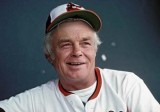and who cannot be, I found it fascinating watching the MLB World Series specials for 1969, -70 and -71, which happen to coincide with Earl's first three years as manager of the Orioles.
They had Earl mic'd in one or two of them, and you got to listen to his mound visits. They were very revealing of his persona and his style of relating to his players. He was EXTREMELY confident in his offense, and he was genuinely nonplussed when Pittsburgh grounded their attack.
 ...........
...........
=== John Jaso as Polar Opposite of Miguel Olivo ===
A glance suffices to verify the wisdom of this USSM assessment. Thusly:
| HR's, vicious swing | Low ISO, nauseatingly static swing |
| Gasp-inducing EYE ratio | EYE that has been as high as 1.5 (!) |
| Cruise-missile arm | Noodle arm |
| RH, Latin-speaking | LH, English-speaking (think Felix, Pineda etc) |
| UFC-ready | NYT Crossword-ready |
You might line up all the catchers of 2011 -- all 107 of them -- and find Miguel Olivo at the end of the line, nobody on his right, and Jaso at the other end, nobody on his left.
Dr. D has constantly whined about the Lou Piniella-, Mike Hargrove-style lazy benches. Sweet Lou would put three, literally 3, switch-hitting middle infielders on his bench. Managing is high-pressure, of course, and it must be tempting to insure yourself against poor planning.
But teams can win games with bench players, and when they do, they do so by filling their benches with tools that complement one another. Eric Wedge will be in a position to select Wire-Stripper Jaso when he's facing a wild, slider-throwing pitcher and slow baserunners. He'll be in a position to select Mini-Sledge Olivo when he isn't.
............
Another thing about Earl benches: he was in a very small minority of ML managers who preferred to have bats on his bench. Earl would have loved John Jaso.
.
=== OK, Eric, It's On You Babe ===
And when the choice isn't so obvious? ... you and I, Mariner fans, will finally have a hair-fine way to gauge just how brainy Eric Wedge is about his chess tactics.
Dr. D prattles on infuriatingly about how good Earl Weaver was with these lineup decisions. But he was, he was. Time and again you'd see Earl's choices go up there and deliver for him.
Check the season stats for some of those bench players. In 1972, for example, Earl had three bench players with 260-470 at bats and 112-127 OPS+'s. You think that little dude wasn't guessing right about when to play them?
Check the other years too. Season after season, you find three-to-five players who whaled away for 120, 140, even 150 OPS+'s from the bench. Part of that was Earl's eye for talent. Part wasn't. Part was the fact that Earl Weaver could intuit the right guy to play that day.
Here's that 15-degree angle that blind-spots the sabermetrician. What causes a player to have a good year, or a bad one? Have you ever read a single word on that question?
............
With Jaso vs. Olivo, Eric Wedge's guesses will work or they won't. Olivo and Jaso provide him everything he needs to deploy them to plus seasons.
That's on Eric Wedge, period. And I'll have fun watching. :- )
.
Comments
And that they set up their ST roster with three extra bat-only players? ... that would lend a certain attitude to their run-scoring ability...
Earl often had three big hitters on his bench, and the last trip through the lineup, he would use them... as he put it in Earl Weaver On Strategy, "We just kept putting those bats on the bench, and they just kept coming through with big hits for us."
:cpoints: DaddyO
It's an interesting strategic discussion, whether you'd rather have an extra arm or two, or an extra bat or two, and manipulate the chess game from the batter's box or from the mound...
Earl always wanted good SP's and then to manipulate the moves with his substitute RBI men...